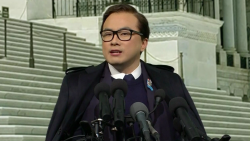Refinery29 did this week what many brands do to show solidarity with the Black Lives Matter movement: Make a design tweak. The site’s homepage color was changed to black, a stark contrast from its signature bright pink and orange hues.
The change did inspire solidarity — but probably not in the way the leaders at the female-centric site intended. In a tweet on Tuesday, former Refinery29 editor Ashley Alese Edwards dismissed the gesture and instead used the opportunity to call out her ex-employer.
“Hey @Refinery29, cool blacked out homepage! But you know what real allyship looks like? Paying your Black employees fairly, having Black women in top leadership positions & addressing the microagressions your Black employees deal with from management on a daily basis,” Edwards tweeted.
Lack of diversity has long been an issue not just at Refinery29 but across the media industry. This week, however, more journalists than ever are speaking out about it in ways they have not before, going on Twitter to publicly name and shame their employers for not doing enough to advocate for a diverse workplace. According to the most recent data from the News Leaders Association, people of color made up 21.9% of salaried employees reported by all newsrooms in the organization’s annual diversity survey.
Among the news outlets that were called out this week are BuzzFeed, Variety and Paper Magazine. Staffers at legacy newspapers such as The New York Times and the Philadelphia Inquirer also contributed to the conversation.
In the wake of the deaths of black Americans that have spurred conversations about and sparked protests over inequality and systematic racism, more journalists are holding their employers and other media companies accountable for their internal workplace policies around and coverage of race, diversity and inclusion.
Media companies under fire
At Refinery29, Edwards’ tweet opened the floodgates. Other former staffers shared their own experiences online, including Sesali Bowen, who tweeted, “As a former employee I can definitely say that Refinery29 is the official publication of White Feminism™. Well meaning, but violently clueless about race.”
Former Refinery29 staffer Channing Hargrove, who was laid off earlier this year, told CNN Business that she spoke out in a tweet because she felt that she “was blackballed at Refinery. I felt no loyalty to them.”
“I’m not going to help them upkeep this bubble of whatever they think is going on,” Hargrove added. “I felt that it’s important for us not to hide these things. It’s kind of like pay disparity. You need to know what other people are making so you know what’s possible for you.”
The labor movement that swept the media industry in the last five years helped draw attention to the problem, with union members calling for newsroom diversity in their negotiations.
On Thursday, Refinery29 union’s official Twitter account tweeted that they “stand in solidarity with former staff members who have spoken out against aggressions they faced while working at @Refinery29.”
A spokesperson for Vice Media, which bought Refinery29 last year, shared a statement from Refinery29’s leadership when asked for comment on the tweets.
“While we have had conversations internally and are continuing to do so, we want to use this moment and this platform to say: We hear you,” the statement said.
Dozens of staffers at the New York Times revolted on Twitter against the publication of an op-ed by Republican Sen. Tom Cotton in which he called for the deployment of soldiers to assist local law enforcement with unrest sparked by the death of George Floyd. The paper later said the piece did not meet its editorial standards.
Journalists of color at The Philadelphia Inquirer sent a letter to management and called out their “careless” and “unempathetic” appropriation of the Black Lives Matter slogan in a headline that read “Buildings Matter, Too.” Some declined to work on Thursday by “calling in sick.” The top editors at the Inquirer issued an apology saying, “We should not have printed it. We’re sorry, and regret that we did.
Variety’s editor-in-chief Claudia Eller announced on Thursday that she is taking a leave of absence after she called freelancer Piya Sinha-Roy “bitter” for criticizing her on Twitter.
Sinha-Roy retweeted a column Eller wrote in which the editor admitted that she had “not done enough” to diversify the staff at the Hollywood trade publication and added, “No, @Variety_Claudia, you haven’t done enough, and nor have most other EICs. I remember speaking with you and @awallenstein years ago about the lack of diversity in your newsroom. POC voices are constantly dismissed. We are not here to make you look better. We are here to work.”
Sinha-Roy told CNN Business that she had confronted Eller in 2014 about the lack of diversity at Variety.
“It was frustrating to see that because I had had this conversation six years ago, and I’m probably one of many people,” Sinha-Roy said. “For me, the challenge is: Why has this not been done already? Why has it taken until now to acknowledge that you need to be better? It feels empty.”
Eller did not respond to CNN Business’ request for comment on Thursday. Jay Penske, CEO of Penske Media, which owns Variety among other publications, said in a memo that Eller’s tweets were “unacceptable.”
‘Something within me was really stirring’
Michael Love Michael, who uses they/them pronouns, had already given notice to leave their job at Paper Magazine before this week. So when CEO Tom Florio sent an email to staff on Monday saying that he vowed to raise awareness and increase coverage on race issues, Michael used the opportunity to write back and criticize what they called Florio and the company’s lack of support for people of color in the workplace. Michael posted the email exchange to Twitter Tuesday.
“In light of the murder of George Floyd and the protests happening all week long, something within me was really stirring,” Michael told CNN Business Thursday. “I already put in my notice, and I felt like after all the things I’ve done, being a black, queer, non-binary person, I felt like it would be my final offering.”
Florio responded in a series of tweets, shared on Paper’s official account. In a statement to CNN Business, Florio said he was “genuinely sorry” for his original email reply to Michael, which he said came off as “dismissive.”
“Over the past two days, I’ve continued to have open dialogue with my entire team who have expressed a wide range of opinions, including views on how we can improve. We’re proud to be a vibrant community with almost 40% people of color, but we can’t be complacent about making sure that every employee feels this is a place they’re supported and can grow as professionals. I certainly can’t claim to have all the answers, but I’m working on specific courses of action now with the help of our team,” Florio said.
Michael’s tweet motivated other former Paper staffers to share their stories. Current editorial staffers also tweeted a statement condemning Florio’s emails.
“The stories of people coming out and saying this are so validating and so meaningful,” Michael said. “Gaslighting within predominantly white workplaces creates this sense of: Am I crazy? But the truth is I’m not. I’m not alone.”
Former Refinery29 staffer Ashley C. Ford told CNN Business that the “gaslighting” is what inspired her to speak out this week. She went on Twitter on Wednesday to call out what she said are the company’s pay disparities.
In another tweet, she said, “I worked at Refinery29 for less than nine months due to a toxic company culture where white women’s egos ruled the near non-existent editorial processes. One of the founders consistently confused myself and one our full-time front desk associates & pay disparity was atrocious.”
When asked why she contributed to the Twitter conversation, former Refinery29 staffer Bowen told CNN Business in an email, “Media has been laying us off in droves and with COVID throwing everything into chaos, it feels like there is very little left to lose.”
BuzzFeed was also scrutinized this week when freelance journalist Patrice Peck on Wednesday criticized the company’s treatment of black staffers. “55-11 Times BuzzFeed’s Woke White Managers/Execs Gaslit TF Out Of Their Black Colleagues, Yasss Kween!!!,” she tweeted.
Peck told CNN Business that feedback she received on her New York TImes op-ed about the stressors that come with being a black journalist motivated her to start a public discussion on Twitter.
“So many of us have tried to work with the companies to resolve these issues, despite most of that work being invisible unpaid labor on top of our actual jobs,” Peck told CNN Business. “But the final straw seemed to be the performative allyship and deluge of Black Lives Matter content proliferating these company’s social media accounts and the recent controversy around the New York Times Tom Cotton op-ed.”
Other former BuzzFeed staffers shared their experiences with what they said was discrimination at the digital media company. Johana Bhuiyan, who now works at the Los Angeles Times, said that she repeatedly had to confront producers about videos she said were offensive to Muslims.
Bhuiyan told CNN Business that she spoke out because she wanted to show support for Peck’s tweets.
“You can’t discount her experience and response if there’s a chorus of voices saying they experienced something similar,” Bhuiyan said.
A BuzzFeed spokesperson said, “We’re not going to comment on the experiences of individual employees, but we hear them. It’s fair to say that we have made mistakes, and the best thing we can do now is listen, learn, and do better.”
‘The struggle continues’
Lowell Peterson, executive director of Writers Guild of America, East which represents Refinery29’s union, said “achieving more equity and inclusion in newsrooms has been a priority of all of the bargaining units we have organized.”
“I think people are motivated by a sense of social justice,” Peterson wrote in an email to CNN Business. “They want to make sure that companies’ speeches about the importance of diversity are backed up by enforceable contract language, and they believe that having people of different backgrounds, perspectives, and experiences is a way to make the coverage more accurate, credible, and powerful.”
Joe Davidson, founding member of the National Association of Black Journalists, told CNN Business that he believes the media industry has “come a long way” since the organization formed in 1975. But he said there’s more to be done.
“You can look at the number of black journalists. It’s grown over the years and certainly black journalists are much more prominent on television now,” Davidson said. “Yet we still find ourselves in the situation where it’s like the struggle continues, basically. This week has shown we still have to work to make a basic level of fairness the default mode and not something we have to continually press upon the media.”




























